
VOCATIONAL SCHOOL
Department of Radio and Tv Programming (Turkish)
MTOI 120 | Course Introduction and Application Information
| Course Name |
Introduction to Tourism Economics
|
|
Code
|
Semester
|
Theory
(hour/week) |
Application/Lab
(hour/week) |
Local Credits
|
ECTS
|
|
MTOI 120
|
Fall/Spring
|
3
|
0
|
3
|
4
|
| Prerequisites |
None
|
|||||
| Course Language |
Turkish
|
|||||
| Course Type |
Service Course
|
|||||
| Course Level |
Short Cycle
|
|||||
| Mode of Delivery | - | |||||
| Teaching Methods and Techniques of the Course | Lecture / Presentation | |||||
| Course Coordinator | - | |||||
| Course Lecturer(s) | ||||||
| Assistant(s) | - | |||||
| Course Objectives | The aim of this course is to convey the information that will enable to evaluate the basic economic topics used in economic analysis in tourism enterprises from the point of view of tourism. |
| Learning Outcomes |
The students who succeeded in this course;
|
| Course Description | Concept of economy, tourism supply, tourism demand |
|
|
Core Courses | |
| Major Area Courses | ||
| Supportive Courses | ||
| Media and Management Skills Courses | ||
| Transferable Skill Courses |
WEEKLY SUBJECTS AND RELATED PREPARATION STUDIES
| Week | Subjects | Related Preparation |
| 1 | Introduction to Tourism Economics, Basic Concepts of Economics | ÇEKEN Hüseyin, Turizm Ekonomisi, Detay Yayıncılık, 2016, Ankara, Sayfa 1-12. |
| 2 | Basic concepts about tourism | ÇEKEN Hüseyin, Turizm Ekonomisi, Detay Yayıncılık, 2016, Ankara, Sayfa 13-28. |
| 3 | Globalization and Tourism | ÇEKEN Hüseyin, Turizm Ekonomisi, Detay Yayıncılık, 2016, Ankara, Sayfa 29-48. |
| 4 | Tourism Supply | ÇEKEN Hüseyin, Turizm Ekonomisi, Detay Yayıncılık, 2016, Ankara, Sayfa 49-64. |
| 5 | Tourism Demand | ÇEKEN Hüseyin, Turizm Ekonomisi, Detay Yayıncılık, 2016, Ankara, Sayfa 65-82. |
| 6 | Concept of Market, Tourism Market | ÇEKEN Hüseyin, Turizm Ekonomisi, Detay Yayıncılık, 2016, Ankara, Sayfa 83-95. |
| 7 | Market types and firm balance in tourism sector | ÇEKEN Hüseyin, Turizm Ekonomisi, Detay Yayıncılık, 2016, Ankara, Sayfa 96-112. |
| 8 | Midterm | - |
| 9 | The place and importance of tourism sector inregional development | ÇEKEN Hüseyin, Turizm Ekonomisi, Detay Yayıncılık, 2016, Ankara, Sayfa 113-124. |
| 10 | Monetary economic effect of tourism | ÇEKEN Hüseyin, Turizm Ekonomisi, Detay Yayıncılık, 2016, Ankara, Sayfa 125-138. |
| 11 | Measuring the real economic effects of tourism | ÇEKEN Hüseyin, Turizm Ekonomisi, Detay Yayıncılık, 2016, Ankara, Sayfa 139-152. |
| 12 | Economic (positive / negative) effects of tourism | ÇEKEN Hüseyin, Turizm Ekonomisi, Detay Yayıncılık, 2016, Ankara, 153-161. |
| 13 | An overview of economic planning and policies in tourism | Bahar, O. ve Kozak, M., Turizm Ekonomisi, Detay Yayıncılık, 2006, Ankara, Sayfa 183-203. |
| 14 | International competition in tourism | ÇEKEN Hüseyin, Turizm Ekonomisi, Detay Yayıncılık, 2016, Ankara, Sayfa 162-174. |
| 15 | Evaluation of the semester and General Review | |
| 16 | Final Exam |
| Course Notes/Textbooks | Bahar, O. ve Kozak, M., Turizm Ekonomisi, Detay Yayıncılık, 2006, Ankara. ISBN:9789758969678 |
| Suggested Readings/Materials |
EVALUATION SYSTEM
| Semester Activities | Number | Weigthing |
| Participation |
1
|
10
|
| Laboratory / Application | ||
| Field Work | ||
| Quizzes / Studio Critiques | ||
| Portfolio | ||
| Homework / Assignments | ||
| Presentation / Jury | ||
| Project | ||
| Seminar / Workshop | ||
| Oral Exams | ||
| Midterm |
2
|
40
|
| Final Exam |
1
|
50
|
| Total |
| Weighting of Semester Activities on the Final Grade |
4
|
50
|
| Weighting of End-of-Semester Activities on the Final Grade |
1
|
50
|
| Total |
ECTS / WORKLOAD TABLE
| Semester Activities | Number | Duration (Hours) | Workload |
|---|---|---|---|
| Theoretical Course Hours (Including exam week: 16 x total hours) |
16
|
3
|
48
|
| Laboratory / Application Hours (Including exam week: '.16.' x total hours) |
16
|
0
|
|
| Study Hours Out of Class |
16
|
3
|
48
|
| Field Work |
0
|
||
| Quizzes / Studio Critiques |
0
|
||
| Portfolio |
0
|
||
| Homework / Assignments |
1
|
4
|
4
|
| Presentation / Jury |
0
|
||
| Project |
0
|
||
| Seminar / Workshop |
0
|
||
| Oral Exam |
0
|
||
| Midterms |
2
|
5
|
10
|
| Final Exam |
1
|
10
|
10
|
| Total |
120
|
COURSE LEARNING OUTCOMES AND PROGRAM QUALIFICATIONS RELATIONSHIP
|
#
|
Program Competencies/Outcomes |
* Contribution Level
|
||||
|
1
|
2
|
3
|
4
|
5
|
||
| 1 | To be able to define the historical development process, fundamental principles, and theories of Radio and Television Programming, and explain the basic principles of audio-visual storytelling. |
|||||
| 2 | To be able to utilize technical equipment and software requiring expertise in the field of Radio and Television Programming according to contemporary techniques. |
|||||
| 3 | To be able to describe the pre-production research of an audio-visual work, scriptwriting, production planning, camera usage, sound recording, lighting setup, and post-production editing design at a fundamental level and apply at least one of them at an advanced level. |
|||||
| 4 | To be able to apply standard video shooting and sound recording indoors and outdoors within the scope of a production in teamwork. |
|||||
| 5 | To be able to explain the national and universal values, professional and ethical principles, and legal regulations required in radio-television broadcasting. |
|||||
| 6 | To be able to evaluate audio-visual outputs based on technical and methodological criticism. |
|||||
| 7 | To be able to generate creative and critical approaches and projects suitable for the broadcasting platform and selected media, taking responsibility in individual or teamwork. |
|||||
| 8 | To be able to consider occupational safety principles while working in media, production, and press-broadcasting fields. |
|||||
| 9 | To be able to apply the knowledge gained in classes within the scope of an internship in relevant job fields. |
|||||
| 10 | To be able to follow the information in the field and communicate with colleagues by using English at the general level of European Language Portfolio A2. |
|||||
| 11 | To be able to possess interdisciplinary knowledge in artistic, cultural, and social issues related to communication fields and programs. |
|||||
| 12 | To be able to direct their learning towards an advanced educational level by keeping track of technological changes and innovations, considering a lifelong learning vision. |
|||||
| 13 | To be able to analyze the universal and social dimensions and legal consequences of their professional work in the field concerning human rights, cultural diversity, environmental issues, public interest, and public service. |
|||||
*1 Lowest, 2 Low, 3 Average, 4 High, 5 Highest
NEWS |ALL NEWS
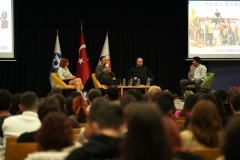
‘Mortal World 2’ actors at IUE
Sarp Apak and Ahmet Mümtaz Taylan, the actors of the film ‘Ölümlü Dünya 2’ (Mortal World 2), which has garnered significant attention
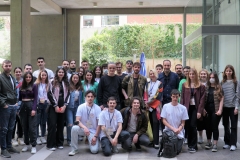
500 students met at the 'festival'
Izmir University of Economics (IUE) Vocational School held one of the biggest design and creativity festivals in the city. 500 students participating

PA’s to the world-famous program from IUE
Hilal Yapıcıoğlu and Doğukan Sözen, students of Izmir University of Economics (IUE) Radio and Television Programming, worked as 'production assistants' in the
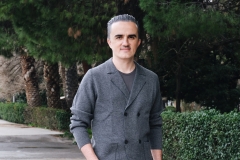
Turkish photography will be promoted in Italy
IUE Lecturer Emre Küheylan was invited as a curator and speaker to the world-famous photography festival called 'Photolux' to be held in

'Turkish coffee' and 'fortune telling' became a documentary
'Turkish coffee', which has become one of the indispensable values of our culture, inherited from centuries ago, and 'coffee fortune-telling', which many
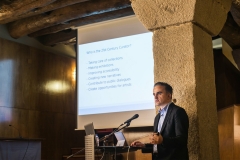
The first Turkish person in the giant jury
Emre Küheylan, Lecturer at Izmir University of Economics (IUE), who has works that made a difference in photography, whose works are exhibited
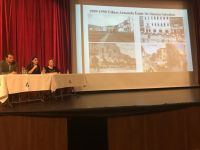
IZMIR CINEMAS WILL REVIVE
Film industry has been addressed at the “Revive Cinema in Izmir Again!” themed panel that took place on Thursday, December 20 at

